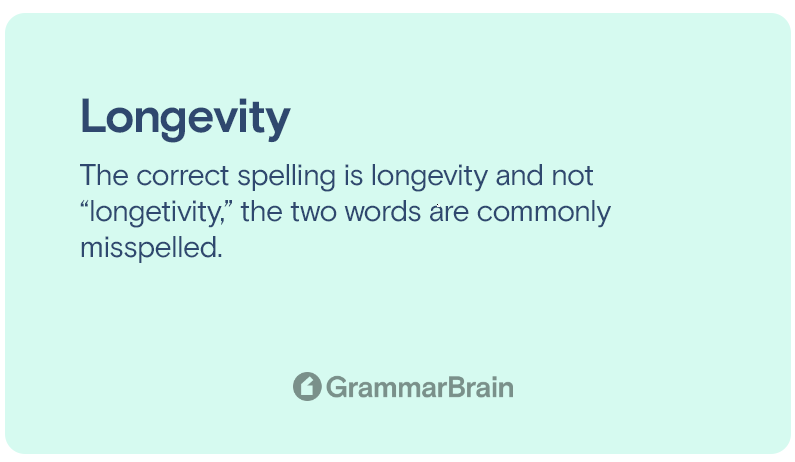Is the correct spelling longetivity or longevity? Why is it a common misspelling? Get the correct spelling and answers to your questions in this short American English guide.
Longetivity vs Longevity: Which is Correct?
Is it longetivity or longevity? Have you seen the word longetivity in use? Does longetivity pop up in your mind rather than longevity?
To answer, longetivity is not a real word and should be refrained from using. However, longevity is the correct word to use.
As longetivity is not a word, it is hardly ever seen to be used in written documents and there have been very rare occurrences. According to the data by Google’s Books Ngram Viewer, the graph curve for longetivity is shown to be flat, as if there has been no existence of the term.
Meaning of Longevity
Meaning of longevity is a long duration of individual life or the length of life. It is also referred to as a long continuance.
Origin of Longevity
According to the Etymology of the word longevity, it is said to be of Latin origin in the early 17th century. It comes from the late Latin word longaevitas from longus “long” + aevum “age”.
On the other hand, longetivity is a rare form of a word that hardly ever appears on the web. It pops up easily, rather longevity for some people due to the analogy with similarly ending words (-vity) such as positivity, activity, negativity, and creativity, among others. This similarity makes people think as longetivity being the likely option.

When to use “Longevity”?
Longevity can be used to describe the length of any living organism’s lifetime. It can also mean a very long duration, such as in the case of tortoises for example.
Longevity is also referred to as the duration of continuance or service at a particular place of work. For example, She had unusual longevity in the organization for 17 years.
Longevity Sentence Examples
Example 1: The longevity of any living organism varies greatly depending on multiple factors such as genetics and environment.
Example 2: For healthy living and increased longevity, a balanced diet including fruits, vegetables, grains, nuts, meat, and dairy products, along with a good fitness regime is necessary and required.
Example 3: While buying a smartphone, I always consider the build quality, display features, processor, and longevity of the device for long-term use.
Example 4: This drug significantly helped improve longevity among cancer patients, although its use could not be continued due to other health-damaging side effects.
Example 5: Leather in fashion is one of the highly preferred materials. Even though leather requires a lot of care, people are fond of it due to its high quality and longevity.
Longevity, Life Expectancy, Lifespan: The Difference
One of the most common synonyms for longevity is life expectancy. The terms longevity, life expectancy, and lifespan, all relate to the number of years for which someone lives. Due to this similarity, people use these terms interchangeably at times. Although, they are quite different in meaning.
Longevity is defined as a long duration of individual life.
The definition of life expectancy is the average life span of an individual. Your life expectancy is dependent on various factors such as genetics, environment, age, gender, and diet, among others. For example, further research can provide better information about life expectancy in reference to work and depression.
Life Span is defined as the average length of life of an organism or a material object in a particular environment. For example, The potential life span of a chimpanzee has been estimated at 60 years, whereas, it is about 25 years for a monkey.
Inside this article
Fact checked:
Content is rigorously reviewed by a team of qualified and experienced fact checkers. Fact checkers review articles for factual accuracy, relevance, and timeliness. Learn more.
Core lessons
Glossary
- Abstract Noun
- Accusative Case
- Anecdote
- Antonym
- Active Sentence
- Adverb
- Adjective
- Allegory
- Alliteration
- Adjective Clause
- Adjective Phrase
- Ampersand
- Anastrophe
- Adverbial Clause
- Appositive Phrase
- Clause
- Compound Adjective
- Complex Sentence
- Compound Words
- Compound Predicate
- Common Noun
- Comparative Adjective
- Comparative and Superlative
- Compound Noun
- Compound Subject
- Compound Sentence
- Copular Verb
- Collective Noun
- Colloquialism
- Conciseness
- Consonance
- Conditional
- Concrete Noun
- Conjunction
- Conjugation
- Conditional Sentence
- Comma Splice
- Correlative Conjunction
- Coordinating Conjunction
- Coordinate Adjective
- Cumulative Adjective
- Dative Case
- Determiner
- Declarative Sentence
- Declarative Statement
- Direct Object Pronoun
- Direct Object
- Diction
- Diphthong
- Dangling Modifier
- Demonstrative Pronoun
- Demonstrative Adjective
- Direct Characterization
- Definite Article
- Doublespeak
- False Dilemma Fallacy
- Future Perfect Progressive
- Future Simple
- Future Perfect Continuous
- Future Perfect
- First Conditional
- Irregular Adjective
- Irregular Verb
- Imperative Sentence
- Indefinite Article
- Intransitive Verb
- Introductory Phrase
- Indefinite Pronoun
- Indirect Characterization
- Interrogative Sentence
- Intensive Pronoun
- Inanimate Object
- Indefinite Tense
- Infinitive Phrase
- Interjection
- Intensifier
- Infinitive
- Indicative Mood
- Participle
- Parallelism
- Prepositional Phrase
- Past Simple Tense
- Past Continuous Tense
- Past Perfect Tense
- Past Progressive Tense
- Present Simple Tense
- Present Perfect Tense
- Personal Pronoun
- Personification
- Persuasive Writing
- Parallel Structure
- Phrasal Verb
- Predicate Adjective
- Predicate Nominative
- Phonetic Language
- Plural Noun
- Punctuation
- Punctuation Marks
- Preposition
- Preposition of Place
- Parts of Speech
- Possessive Adjective
- Possessive Determiner
- Possessive Case
- Possessive Noun
- Proper Adjective
- Proper Noun
- Present Participle
- Prefix
- Predicate



